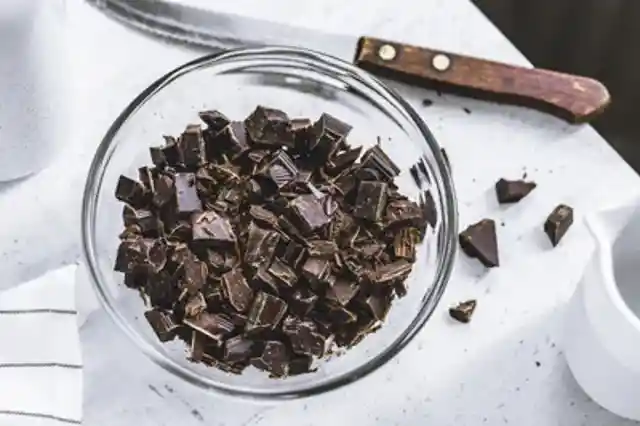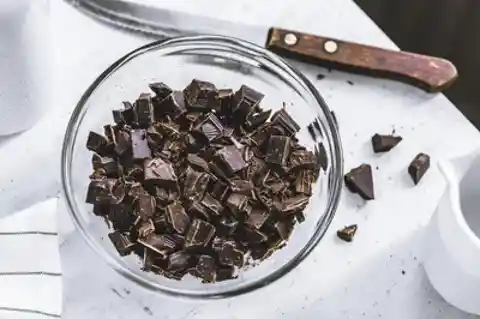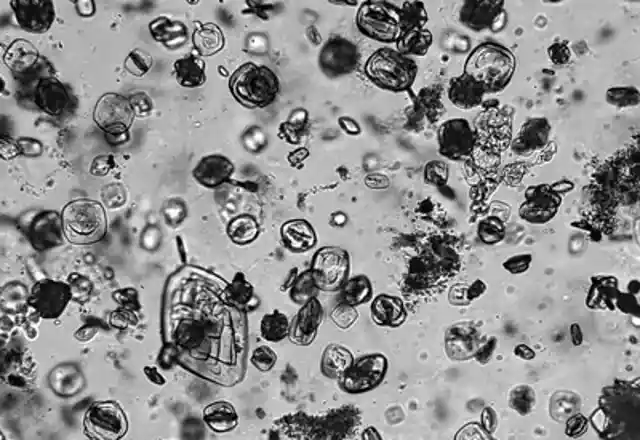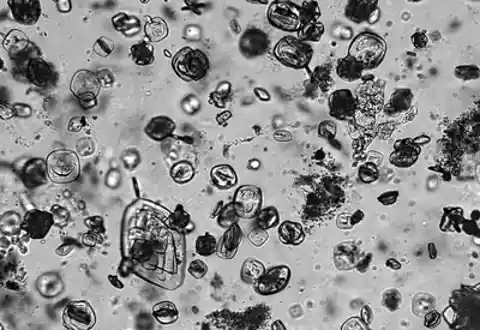It's pretty high in calories
Here's something you may not know about dark chocolate: it's pretty calorie dense. Sure, it does boast its fair share of health perks, but even a small bar can contain a significant amount of calories - we're talking upward of 350kcal. Not ideal for those keeping an eye on their daily intake.


Of course, there's no harm in earing dark chocolate as part of a balanced diet, but make sure you're taking into account that calorie count - especially if you're trying to maintain or lose weight. Enjoy, but remember, moderation is key and a small amount can satisfy your sweet tooth whilst still keeping your waistline in check!
Dark chocolate often contains added sugars
Dark chocolate has often been touted as a much healthier choice than its milk and white counterparts. But, guess what? It often still contains a fair amount of sneakily added sugar. And this can counter some of its positive effects - turning it into from something 'superfood-y' to something simply 'food-y'.


As we all know, it's never recommended to consume too much sugar, due to the myriad health issues linked to it. So, when you're picking your next bar of dark chocolate, take a moment to check the label for sugar content. High in added sugars? Perhaps consider a different brand.
It's surprisingly high in saturated fats
Here's a lesser-known fact about dark chocolate: it can be pretty high in saturated fats. These fats should be consumed in moderation, as excessive amounts can increase cholesterol levels, and in turn heighten the risk of heart disease. Has this dampened your view of dark chocolate as a healthy snack?


Well, don't worry too much - dark chocolate is still healthier than many other chocolate varieties. The key is moderation. Balance your intake with other foods that are lower in fat to find that sweet (pun intended!) spot -where you can enjoy some rich dark chocolate without compromising your heart health.
There's a possibility of heavy metal contamination
Now, this one might surprise you: dark chocolate can potentially contain heavy metals like lead and cadmium. How? Well, these metals can be naturally absorbed by cocoa plants from the soil leading them to end up in your chocolate bar. But, don't rush to throw out all your dark chocolate just yet!


There's no need for immediate panic, as the levels are usually below harmful limits. It's just that consistent intake over time could lead to an accumulation in your body - and you probably don't need us to tell you, that's not great for your health.
It may cause allergic reactions in some people
For some, dark chocolate can trigger allergic reactions. Dark chocolate products can often contain traces of common allergens like milk, nuts, and soy - all of which can potentially cause nasty reactions to those sensitive to them. Don't have any known allergies yourself?


Well, you may not be exempt from a little discomfort, as all of the above ingredients could lead to bloating or indigestion. When you're next grabbing a bar of dark chocolate, make sure you check the ingredient list - particularly if you have known food sensitivities or allergies - as you never know what unexpected allergens could be included.
Dark chocolate can disrupt sleep
A not-so-sweet fact about dark chocolate is its caffeine content. Now, it's not going to hit you like a cup of coffee, but it's still there. And if you're someone who's super sensitive to caffeine, even that little bit can affect your sleep. Are you someone who struggles with sleep issues?


If the answer is yes, this is definitely something to keep in mind. We all love indulging in a little sweet treat, but timing is key. Our advice? If your treat of choice is dark chocolate, make sure you have it well in advance of bedtime.
It can contribute to acid reflux or heartburn
Did you know that dark chocolate isn't necessarily the most stomach-friendly? That's right - it can actually lead to acid reflux or heartburn. The caffeine and theobromine found in dark chocolate are known to relax the esophagus, which can result in these uncomfortable conditions.


Not the best news if you're prone to digestive issues, right? So, if you've ever experienced that burning sensation after a chocolate treat, it might be best to consider cutting back a bit or, even better - choose a different snack.
It can contribute to acne
Struggling with bouts of acne, and finding that no matter what skincare routine you try, nothing seems to be improving it? Well, it could be to do with what you’re eating. We’re not talking greasy fast food here, even dark chocolate can contribute to acne.


Basically, some of its ingredients can trigger hormonal fluctuations, which can unfortunately lead to breakouts. If you've been struggling with acne and can't seem to figure out why, maybe consider cutting back on dark chocolate. You might be surprised by the changes!
It can be addictive
Do you find that whenever you have a bar of dark chocolate, you find yourself craving just that little bit more? Well, this isn’t surprising, as it turns out dark chocolate can be kind of addictive. This is mainly due to its sugar and fat content.


Essentially, these ingredients trigger the pleasure centers in your brain, making you crave more. Obviously a little treat is fine, but keep this fact in mind. It should make it easier for you to rationalize your cravings, and in turn help you refrain from reaching for more and more.
It's not always ethically sourced
Now this one is a slight tangent from the nutritional considerations, but might still leave a bitter taste in your mouth. Not all dark chocolate is ethically sourced, which means the cocoa used in your chocolate bar might come from places where workers, unfortunately, face poor conditions or even forced labor.


It's a serious concern for anyone who cares about where their food comes from - which should, of course, be all of us! So, how can you be sure your dark chocolate is ethically sourced? Look for labels like Fair Trade or Rainforest Alliance - they run pretty extensive checks before giving a company accreditation.
It may lead to dental problems like cavities
While dark chocolate might be a tasty treat, it’s not always a treat for your teeth. Yep, dark chocolate can lead to dental problems like cavities. Bascially, the sugar in the chocolate feeds the bacteria in your mouth, leading to tooth decay.


So, next time you're enjoying a piece of dark chocolate, maybe consider brushing your teeth straight afterwards instead of waiting until your routine end of the day brush. It's a simple step that can help keep your smile healthy and cavity-free.
Dark chocolate is high in oxalates
Are you aware that dark chocolate is rich in oxalates? And what exactly are oxalates, you might ask? Basically, They're compounds that, unfortunately, can lead to kidney stones, a painful condition that can make going to the bathroom absolute agony.


Despite their often tiny size, kidney stones can cause massive discomfort and in some cases require surgery to remove. If you're at risk, you might want to think twice before snacking on dark chocolate, and look out for a low-oxalate snack instead.
It might trigger migraines
Dark chocolate can actually trigger migraines in some people, due to compounds like tyramine, phenylethylamine, and caffeine - all of which are known to potentially heighten the risk of migraines. Ever noticed a headache creeping up after enjoying a piece of dark chocolate? This might be the reason.


If you’re a chocolate lover who suffers from migraines – you'll likely not be too keen on the idea of cutting it out. We get it, but, sometimes avoiding that intense pain might be worth skipping the dark chocolate. So, maybe save it just for for special occasions, and see if it makes a difference.
It's not always gluten-free
If you're gluten-sensitive or celiac, here's something you should be aware of: not all dark chocolate is guaranteed to be gluten-free. Unfortunately, some brands may actually actively include gluten, or for others, there's a risk of cross-contamination during the production process.


Always check the label, and if it’s not clear, reach out to the company just to be sure. It's a little inconvenient, yes, but less so than the reaction you may experience if you accidentally consume gluten. We should all be able to enjoy a treat without the worry of a bad reaction.
It can worsen symptoms of anxiety
If you struggle with anxiety, here's something important to take note of: dark chocolate might actually worsen your symptoms. Basically, the caffeine and theobromine in it can stimulate your nervous system, potentially leading to increased anxiety - showing as a faster heart rate, jitteriness, or just feeling not quite right.


It's a bit of a downer, especially if you love your chocolate as a comfort food. But if you've been feeling more anxious lately, and haven’t been able to pinpoint why, it might be worth cutting back on the dark chocolate to see if it makes a difference – you may be pleasantly surprised!
It can interfere with calcium absorption
Here's an interesting one: dark chocolate can actually interfere with your body's ability to absorb calcium. Sounds odd, especially given that milk chocolate is lauded for the calcium it contains. But in the case of dark chocolate, it's quite the opposite.


The oxalates in dark chocolate bind with calcium and may lead to less absorption. Not great news, especially if you're trying to keep your bones strong. If you're a fan of dark chocolate but also conscious about your calcium intake, it might be worth balancing out your diet with calcium-rich foods.
It may contain pesticide residue
Did you know that some dark chocolate could have traces of pesticide residue? Yep, depending on how the cocoa beans are grown and processed, they could be exposed to the pesticides used in farming. It's not the most appetizing thought.


Don’t throw your dark chocolate away just yet though - most levels found in chocolate are within safe limits, but it's still something to be aware of if you consume a lot. Still wary? Consider opting for organic dark chocolate as a safer bet, as there’s a much lower chance of pesticide residue.
Some dark chocolate brands have a high glycemic index
This might surprise you: despite its reputation as a healthier chocolate choice, some dark chocolate brands actually have a super high glycemic index. This means they can cause a rapid spike in your blood sugar levels. Doesn’t sound great, does it?


Especially if you're watching your sugar intake or managing diabetes. Always make sure to check the label for sugar content and try to choose brands with lower sugar levels. Remember, it’s all about balance - finding the sweet spot between treating yourself and health.
It may contain unhealthy additives and preservatives
So, we’ve spoken about the sugar and fat content often found in dark chocolate, but did you know it often also contains unhealthy additives and preservatives. Depending on the brand, these can range from artificial flavors to stabilizers that extend shelf life.


While they make the chocolate last longer and yes, could make it taste better, they're not always great for your health. If you're trying to eat clean or avoid certain chemicals, it's worth reading those ingredient lists closely (yes, again!). It's probably best to go for brands that are more natural.
Dark chocolate might interact with certain medications
Did you know that dark chocolate might not play well with certain medications? That's right, some of the compounds in dark chocolate, like caffeine and theobromine, can interact with various drugs, affecting how they work. This could be anything from blood thinners to antidepressants.


If you're on medication, it's a good idea to do some research to check, or even better, have a chat with your doctor about your eating habits, just to be on the safe side. After all, it's always better safe than sorry when it comes to your health!
Not all dark chocolate brands are created equal
If you're choosing dark chocolate for its health benefits, here's a heads-up: the flavonoid content varies a lot across different brands. Flavonoids are the antioxidants that give dark chocolate its health-boosting reputation. But guess what? Not all chocolate is created equal.


Some brands might have less and some might have more - it's all dependent on things like the processing and origin of the cocoa. So, if you're after those antioxidants, do a little research to find the brand that'll give you the most bang for your buck!
Not all dark chocolate is vegan
Many people believe that dark chocolate is vegan, simply due to the lack of the word ‘milk’ in the name. And they’re not far off, but for the vegans out there, a cautionary note: not all dark chocolate is actually vegan. Some brands use dairy or other animal products in their recipes.


It can be a bit challenging to navigate if you're trying to stick to a vegan diet. Again, always check the label for ingredients like milk, fat, or other non-vegan ingredients. They might be a little further down on the ingredient list than they are for milk chocolate, so make sure you scan properly!
It may trigger IBS symptoms
IBS is a pain, isn’t it? Both literally and figuratively. If you have IBS, you’ll be familiar with how much a flare up can negatively affect your day. What you may not know is that dark chocolate could be a trigger. Ingredients in chocolate like the caffeine, and high-fat content can irritate your gut, potentially setting off a flare up.


It's a bit of a balancing act, enjoying the foods you love while managing your symptoms. If you've noticed a link between your chocolate treats and IBS flare-ups, it might be worth cutting it out for a bit to see if it could be a cause.
It can contribute to weight gain
While we're bursting bubbles, let's talk about weight gain and dark chocolate. Yes, it's delicious and yes, it feels like a treat, but given its moreish nature, those calories can really sneak up on you, leading to unwanted weight gain.


This is especially true if you're not keeping track of your overall intake. A square here, and another few squares there? It adds up fast. We know, it's hard to resist, but moderation is key here. Remember, even healthy foods can contribute to weight gain if consumed in excess.
Some varieties are high in sodium
Did you know that some types of dark chocolate come with a hidden surprise? And no, it's not the good kind. We're talking about sodium. High levels of sodium are a no-no for a healthy heart, and unfortunately, certain dark chocolate brands actually pack more than you'd expect.


Now, this is concerning for anyone, but is of course particularly concerning for those who are monitoring their blood pressure or trying to lower their risk of heart disease. So, keeping checking those labels before buying, and add low sodium to the checklist of what to avoid!
It's not a substantial source of essential nutrients
Dark chocolate often gets a lot of hype for its health benefits, but here's a reality check: it's not a substantial source of essential nutrients. Sure, it contains some minerals like magnesium and iron, but the amounts are relatively small. You're not going to meet your daily nutritional needs by eating dark chocolate.


If you're looking for nutrient-rich foods, you're much better off with fruits, vegetables, whole grains, and lean proteins. Dark chocolate can be included as part of a balanced diet, but it shouldn't be relied upon as a significant source of nutrition.
It's not always great for skin health
Moving back to skin health, dark chocolate can also have a negative effect on our skin beyond acne breakouts. It may feel a bit of a letdown, especially if you've been eating dark chocolate thinking because it’s a ‘superfood’ it'll be super for your skin.


The reality is, depending on your skin type and sensitivity, dark chocolate can actually worsen existing skin problems. So, if you're struggling with your skin - be it rashes, uneven skin texture, or redness - it might be worth thinking about whether your chocolate habit is playing a role.
It may worsen symptoms of GERD
If you're someone who deals with GERD, you know all about that not-so-great burning sensation. And guess what? Your dark chocolate treat might be partly to blame. It's the caffeine and theobromine in dark chocolate that can make your stomach a bit unruly.


Leading to more frequent and intense heartburn. So, if you've noticed that dark chocolate seems to make your GERD act up, it might be worth cutting back a bit. No need to ditch it completely, just find a balance that keeps your stomach happy.
It's not always a significant source of dietary fiber
Dark chocolate is often hailed as a source of dietary fiber. But, here's the truth: not all dark chocolates are loaded with it. Sure, some brands might boast a decent amount of fiber, but others are surprisingly lacking.


And with fiber being essential for our digestive health - relying on dark chocolate as a significant source, may not be the wisest of moves. For real fiber benefits, you're better off sticking to whole foods like fruits, vegetables, and whole grains. An added bonus? They also tend to be more nutritionally complete.
It can contribute to increased heart rate
Here's something that might get your heart racing, and not in a good way: dark chocolate can actually contribute to an increased heart rate. This is due to the caffeine and theobromine content that we spoke about earlier.


Picture this: you're enjoying a relaxing evening on the sofa: you're chilling out, eating chocolate, and watching your favorite comfort films - and then suddenly your heart starts thumping away. It’s definitely not a settling feeling. Though it’s nothing to worry about too much for most of us, if you’ve got an existing heart problem, it’s probably better to steer clear.
It may lead to emotional eating
Chocolate is often seen as a comfort food, and dark chocolate is no exception. But, this comfort can lead to emotional eating. Just like how in movies people often turn to a big tub of ice cream when they’re going through something, it's easy to turn to a bar of dark chocolate when you're feeling down or stressed.


This is a habit that can create an unhealthy relationship with food – leading to overindulgence. It’s important to be mindful of why it is you're reaching for that piece of chocolate – is it hunger, or is it emotion?
It could be cross-contaminated with nuts and dairy
Got allergies? Well make sure you're careful when it comes to dark chocolate, as it's often cross contaminated with nuts and dairy. And here’s the thing - even if a chocolate bar doesn't list these ingredients, it might have been made somewhere that handles them, risking cross-contamination.


So, always check the labels super carefully, as the allergens may not be detailed on the ingredient list but instead noted separately as ‘traces of’. And, if in doubt, your best bet is to reach out to the company to make sure you don’t end up having an allergic nightmare.
It's not universally affordable as a health food
Let’s talk about accessibility. This is a different kind of ‘negative’ to most of our previous points, but an important one, nonetheless. Dark chocolate is often marketed as a health food, but it's not universally affordable. High-quality dark chocolate can be quite pricey.


You know, the ones with fewer additives and higher cocoa content. So this makes it less accessible as a daily health food option for many people. Yes, dark chocolate can be a healthy treat, but it's not always a feasible option for everyone.
Dark chocolate can have a laxative effect
This one might be a bit surprising, but some dark chocolate varieties can actually have a laxative effect. There's the caffeine content, but it is usually due to certain sweeteners, like sorbitol or maltitol, which can cause digestive issues in some people.


Have you ever felt a bit... unsettled after a dark chocolate binge? That could be why. While it's not a problem for everyone, if you've got a sensitive stomach, be cautious with your dark chocolate intake – and as always, remember to enjoy in moderation!
It might reduce the effectiveness of some nutrient absorption
Dark chocolate might contain a healthy range of nutrients, but did you know it could be affecting your body's ability to absorb others? Dark chocolate contains substances that might bind with minerals like calcium and iron.


What does this mean? Well, that binding could hinder their absorption. Now, this isn't a call for alarm if don’t eat much dark chocolate, but if you are someone who eats it a lot, it could lead to nutritional imbalances over time. Remember, always keep it balanced!
It may contribute to increased levels of uric acid
Eating a lot of dark chocolate could increase your levels of uric acid, a chemical byproduct of your body breaking down food and drink and separating it into waste. This is something to be mindful of, especially if you're prone to gout or similar conditions.


Dark chocolate isn't the top offender in this area, but it's still part of the puzzle. The key here is moderation (yet again!). Enjoying dark chocolate in smaller amounts is a smarter choice if you're keeping an eye on your uric acid levels.
It might lead to a false sense of health security
We’ve gone through a fair few points now as to why dark chocolate may not be the super food it’s said to be – so you’re probably quite clued up by now. But many people aren’t, and they let that ‘superfood’ buzzword fool them into a false sense of security.


Yes, dark chocolate does have its antioxidants and brain-boosting benefits, but that doesn't mean these are a free pass to indulge without limits. This misperception can lead to people overlooking the high calorie, sugar, and fat content that we’ve discussed.
It could contribute to insulin resistance
Eating too much dark chocolate might make it harder for your body to manage sugar effectively. Insulin is like a key that helps your body use sugar, and overdoing it with dark chocolate can make this process less efficient. Now this is super important for those with diabetes or pre-diabetes.


Of course, enjoying dark chocolate in moderation is usually fine, it's good to be aware of its potential impact on your body's sugar handling abilities. It's all about finding that sweet spot where you can enjoy your treat without stressing your sugar levels.
There's potential for mold and mycotoxin contamination
Ok, let’s take a look into a not so talked about, but pretty disgusting issue: mold and mycotoxin contamination in dark chocolate. Cocoa beans tend to be pretty susceptible to mold, which can produccce harmful mycotoxins. Now, these contaminants are not just a little 'oops' – they can actually pose serious health risks if consumed in large quantities over time.


It's shocking actually, the thought of contaminants in a treat we tend to view as healthy. Of course, most chocolate manufacturers work hard to minimize this risk, but do be aware of that hidden potential danger that could be in lurking in your bar of dark chocolate.
The production process isn't great for the environment
Ok, so this one isn't about health, but it's an appropriate point to add in here as it does take away a little from its 'superfood' status... Did you know that cocoa farming, essential for making dark chocolate, often leads to deforestation?


This is a major issue, and not only disrupts wildlife but also adds to our climate change trouble. The good news is that some brands are getting eco-friendlier. But next time you could go for some dark chocolate - look out for a sustainably-made option.